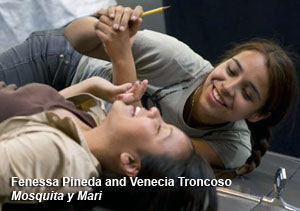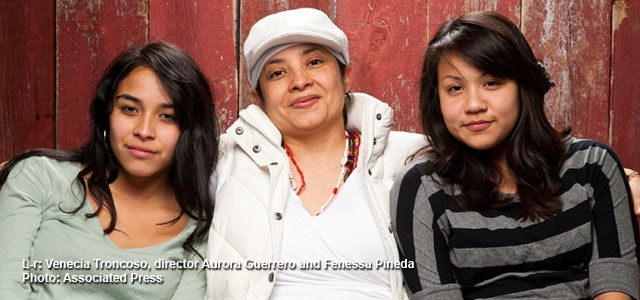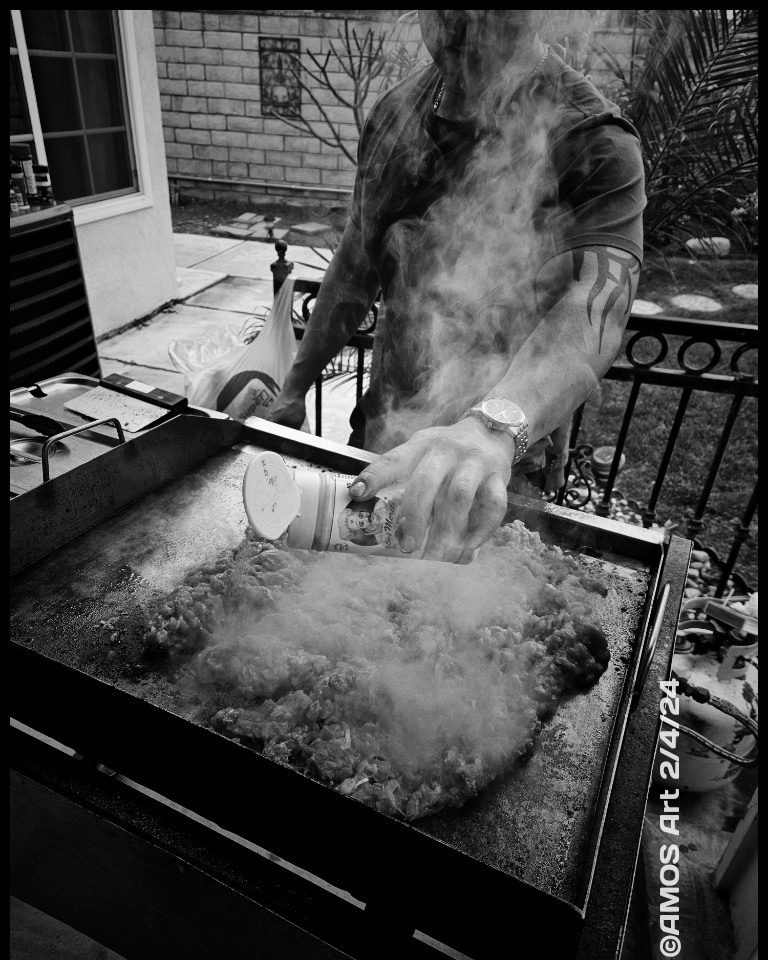By Rosemary Rivera
 Ask director Aurora Guerrero how she feels about her film festival tour and the buzz her film Mosquita y Mari is getting and she’ll tell you, “grateful.” And what about the growing travel schedule and demands of fresh popularity? Guerrero is wary of saying she’s tired; she doesn’t want it misinterpreted as complaining. “I’m so blessed right now. It’s a good problem!”
Ask director Aurora Guerrero how she feels about her film festival tour and the buzz her film Mosquita y Mari is getting and she’ll tell you, “grateful.” And what about the growing travel schedule and demands of fresh popularity? Guerrero is wary of saying she’s tired; she doesn’t want it misinterpreted as complaining. “I’m so blessed right now. It’s a good problem!”
Guerrero’s journey to create Mosquita y Mari is as much a love story as the movie itself. Based on her own experience of self-realization and first love at 13, Guerrero manages to turn a deeply vulnerable moment into a story that reaches out to the viewer. “It comes from such a personal place. You’re doing such guttural work, you don’t know how people are going to respond.”
In fact, the response has been a study in how an earnest story about a teen Chicana’s romantic awakening in South East L.A. can touch people around the world. “I was at Sydney (Australia) for a film screening thinking there was going to be a three-people audience,” says Guerrero. The film was set to be screened early on a work weekday–not the best time for any entertainment debut. “I go in to do a sound check and the theater’s a 500-seater!” She laughs and remembers thinking the venue was going to make the turnout look even more embarrassing. But 300 people, mostly older, packed the place. As they filed out, clearly happy with the viewing, all she could think was, “This film just spoke to 300 non-Latinos.”
 Perhaps Mosquita y Mari’s appeal is due to its universal theme of being young and awkward while figuring yourself out as you fall in love for the first time. The other factor is Guerrero’s deft handling of the narrative: tight and isolated, like the two girls’ lives; each one struggling to move forward in the social and economic margins that come with being Chicana and working class in the U.S. The girls juggle the pressures of achieving and surviving on very little, with trying to live up to the expectations of family and friends. Different as night and day, Yolanda (aka: Mosquita, nicknamed by Mari for being studious and quiet) and tough, street smart Mari’s relationship evolves to a friendship that brings them a fun escape from those pressures. As their bond becomes stronger so do their problems, complicating everything—including their relationship. The result is a story that is subtle but gripping, one that “really speaks to many people,” as Guerrero puts its. It’s quite a feat for a film on the start of young lesbian love, featuring unknown Latina actors.
Perhaps Mosquita y Mari’s appeal is due to its universal theme of being young and awkward while figuring yourself out as you fall in love for the first time. The other factor is Guerrero’s deft handling of the narrative: tight and isolated, like the two girls’ lives; each one struggling to move forward in the social and economic margins that come with being Chicana and working class in the U.S. The girls juggle the pressures of achieving and surviving on very little, with trying to live up to the expectations of family and friends. Different as night and day, Yolanda (aka: Mosquita, nicknamed by Mari for being studious and quiet) and tough, street smart Mari’s relationship evolves to a friendship that brings them a fun escape from those pressures. As their bond becomes stronger so do their problems, complicating everything—including their relationship. The result is a story that is subtle but gripping, one that “really speaks to many people,” as Guerrero puts its. It’s quite a feat for a film on the start of young lesbian love, featuring unknown Latina actors.
Guerrero ultimately went outside the box to get the funding for the production. A film with non-famous Latina leads behind and in front of the lens didn’t attract interest from studios, so she and her producers began considering alternative funding for the project, including Kickstarter. That’s when Sundance, involved with the film from script stage through its development with the Native Indigenous Film Lab and later the Fellowship program with the Ford Foundation, partnered with Kickstarter to launch some films, like Mosquita y Mari. At first Guerrero, a social and community activist based in L.A., was concerned that she would be imposing on her community if she tried to raise large sums from them–amount large enough to make a dent in their $80,000 goal. Then it hit Guerrero: who better to reach out to than her own community?
“Guerrero insisted from the beginning that Mosquita y Mari would be an authentic story, and one that had to be deeply rooted in an actual working-class community similar to the one she grew up in the Bay area.”
And the community came to the rescue in a big way: with two weeks of fundraising left to go, the film had raised an impressive $25,000, but that wasn’t nearly enough to meet the goal, so a last ditch effort to reach out through Facebook, Twitter, and other social media resulted in one of the largest deficit rebounds in the site’s history.
The generosity was not lost on Guererro. In fact, it was a validation of her belief in the power of community, and it bolstered her confidence in making this film. “They’re not investing for profit, they’re investing in the vision, the dream, the community. With a lot of faith, we put (the film) in their hands.”
Guerrero insisted from the beginning that Mosquita y Mari would be an authentic story, and one that had to be deeply rooted in an actual working-class community similar to the one she grew up in the Bay area. She chose Huntington Park in Los Angeles, with its quinceañera shops, bodegas and open streets that offered little variety for the young but plenty of vibrant culture rooted in Chicano heritage. The cast (including lead actors Fenessa Pineda as Yolanda and Venecia Troncoso as Mari) was mainly made up local talent, as was most of the production crew.
It was a filmmaker’s fairy tale come true. Guerrero was able to create a story that stayed true to her vision and used the best instead of the most marketable actors for the story. She was able to get the film financed through hard work and connecting to her audience. What more, Mosquita y Mari, while at Sundance, secured a distribution deal with Wolfe Releasing for DVD and on demand markets after the film completes its run in the festival circuit.
For Guerrero, it’s a sign of exciting times to come for directors of color, women and/or LGBT who want to make their own mark in the filmmaking community. Her advice: “Tell your stories genuinely. Now’s the time to create.”
Creating more is next on Guerrero’s agenda. She’s trying to carve more time to write her next film and has her sights set on creating original content for cable TV. “Lack of representation of people of color is wearing me out. I’m hoping to break that monotony; it’s one of my goals.” In the meantime, Guerrero is busy enjoying her film festival tour for Mosquita y Mari.
You can catch the next screenings at Cinema Village in New York City, August 3-9.











